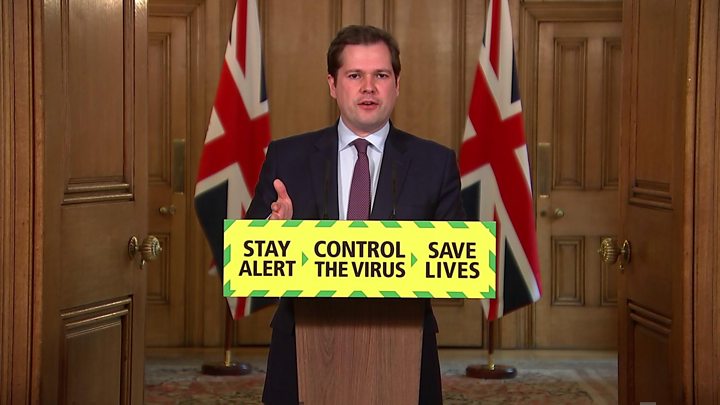Allowing family gatherings is an "important public health issue", England's deputy chief medical officer has said - but it is "complicated" to make the rules fair.
Dr Jenny Harries said such a move could provide a "mental health boost".
But she said if two large families wanted to meet "you end up effectively with quite a large gathering".
Some lockdown measures have been eased in England but restrictions on how many people you can meet remain in place.
Two people from different households can meet in outdoor settings, such as parks - as long as they stay more than two metres apart.
But any larger meetings between different households at the same time are currently banned. The UK government has said this means someone cannot see both parents at the same time.
At the daily No 10 briefing earlier, Dr Harries was asked whether this could be expanded to allow different households to meet as "bubbles" or "clusters".
She said such a move would be particularly beneficial to those "who have been on their own or who are isolated from others".
But she added that any such step had to be "fair" and "consistent with public health advice".
"So for example if you have families with large numbers already in their families who want to meet up, you end up effectively with quite a large gathering even if it's just two families meeting.
"I think it's really important that we think through the implications of that, particularly across families in different circumstances. If your family is a long way away, for example, you may be less able to do that."
Understandably meeting up with family is something we miss dearly.
The government has tried to offer some flexibility in England by allowing people to meet outside in twos where the risk of infection is low because of the ability to keep your distance and the fact you are in the fresh air.
But, of course, that is not the same as having people round for a Sunday lunch or visiting relatives for a weekend.
The problem the government and its advisers face is that the risk coronavirus presents differs hugely depending if you are the grandparent or grandchild.
The average 80-year-old has a nearly one in 10 chance of dying if they are infected, whereas for children the risk is virtually zero.
It's not just about individual risk either. A spike in infections among older people would overwhelm the health service. Around a quarter of people over 70 who are infected need hospital treatment.
Family gatherings, involving multiple generations, where people are in close proximity, are simply too dangerous until we know more about the virus and who in particular among the older generations - and younger people with health conditions for that matter - is most at risk.
Meanwhile, Housing Secretary Robert Jenrick defended the government's decision to allow potential home buyers to view properties in England. The property markets in Wales, Scotland and Northern Ireland remain shut.
Speaking at Wednesday's briefing, he said he had been asked why the government would allow people to "look around a stranger's home but not visit their loved ones or parents".
Mr Jenrick said he understood "why this can seem confusing at first glance" but said estate agents must follow new guidelines during viewings. These include:
- Viewings should first happen "virtually"
- Physical visits by appointments only - no open house
- Speculative viewings are "highly discouraged"
- All internal doors should be opened where possible
- The current occupier should vacate the building during the viewing, for example standing in the garden
- Hand washing upon entering the property
- And all surfaces, including door handles should be "thoroughly cleaned" afterwards

Media playback is unsupported on your device
It is estimated there are 450,000 buyers and renters with plans on hold.
Property website Zoopla previously estimated that about 373,000 property sales had been put on hold during lockdown - with a total value of £82bn.
Mr Jenrick added that it was "essential that we cautiously open up parts of our economy where it's safe to do so".
His call came as the number of people who have died after testing positive for coronavirus in the UK has reached 33,186, a rise of 494 on the previous day.
In other developments:
- Ministers are looking at ways to allow private prayer in places of worship before the buildings are fully opened on 4 July "at the earliest"
- Construction site opening hours are to be extended - staying open until 21:00 BST, Monday to Saturday, subject to local authority approval, Mr Jenrick said
- The government is working "very closely with our main cultural institutions" to see how they might reopen with social distancing in place
- The government again missed its 100,000 daily coronavirus testing target, with 87,063 tests on Tuesday
- The prime minister has been accused of misleading MPs over advice to care homes at the start of the pandemic on controlling infections
- Up to 8,000 jobs are at risk at travel firm Tui, as it pledges to "reinvent the holiday in 2020" amid the pandemic
- Teacher unions have warned that schools do not have adequate safety measures in place to reopen, after the government told them prepare to open for more children from 1 June
- The Transport Salaried Staffs Association is urging the government to extend the coronavirus compensation scheme for NHS and care workers who die with coronavirus to transport workers. It comes after ticket officer Belly Mujinga died with the virus after being spat at by a member of public who claimed to have Covid-19
- A three-day-old baby died in hospital in Swansea after his mother tested positive for coronavirus, an inquest opening has heard.
https://news.google.com/__i/rss/rd/articles/CBMiJmh0dHBzOi8vd3d3LmJiYy5jby51ay9uZXdzL3VrLTUyNjU1NDMx0gEqaHR0cHM6Ly93d3cuYmJjLmNvLnVrL25ld3MvYW1wL3VrLTUyNjU1NDMx?oc=5
2020-05-13 17:34:07Z
52780782207153
Tidak ada komentar:
Posting Komentar